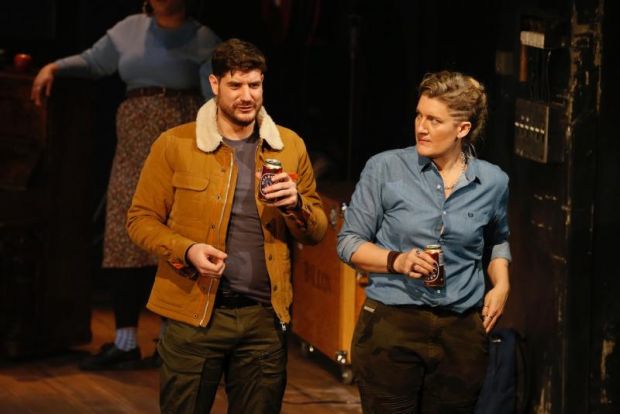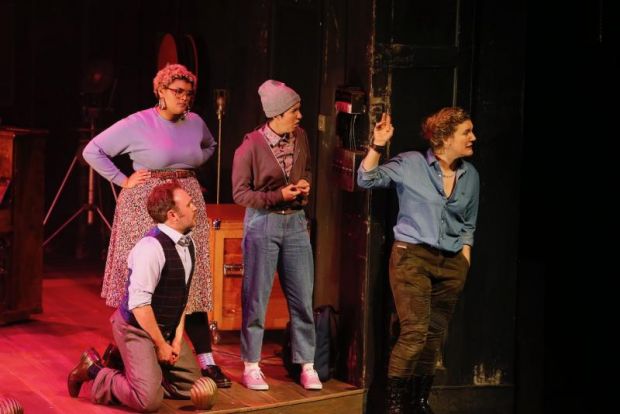Cyrano
On stage we see another stage - bare, shabby, empty. There’s a single work light, trunks, old flats. Old fashioned footlights. Oh. Isn’t this Cyrano de Bergerac? We know there may be one or two changes, but it’s set in a theatre? Yes, it is – because just one of the things this very original adaptation is about, is theatre itself.
After a blackout, six actors, the whole cast, are suddenly there. They come downstage, onto the apron, and look at us. They’re glad to see us, glad we’re there. We’re glad to see them. Live theatre is back. And they never forget or act like we’re not there. The fourth wall is gone.

Edmond Rostand’s 1897 play has been constantly revived, translated, and adapted in theatre and on film. Cyrano has been played by James McAvoy, Peter Dinklage, Gerard Depardieu, Steve Martin as a fire chief in a contemporary America, José Ferrer, Derek Jacobi, our Richard Roxburgh – and now Virginia Gay.
She has taken Edmond Rostand’s play and made a new thing: not just the story of unrequited love and impersonation and the magic of words – all that’s still there – but her gender switch is not just for the sake of a gender switch, for the hell of it. There’s debate about stories, old stories, and new stories and why and how we tell them. It’s about sexuality and body image, and there’s comedy – and ironic sadness - in the way the smartest people can fall for a hunky body; and there’s the way we create a persona to protect ourselves from shame and hurt. Gay’s Cyrano is a soldier, a tough fighter, but also a wit, a poet, and she dominates with apparent self-confidence and sheer panache. There is, however, no nose – just a series of witticisms about it, suggesting a character who inside considers herself unattractive and unworthy.

Three of the cast make up a Chorus, which, as usual with Chorus’s represents us – but here each represents a different take on the story. Chorus 1 (Milo Hartill) is the relaxed but supportive observer. Chorus 2 (Robin Goldsworthy) is the theatre tragic, desperate to be a ‘developed character’ and is the scruffy but romantic traditionalist, chafing at changes to Rostand and yearning for the old swash and buckle, ruffs, big hats, swordplay, and tragedy. Chorus 3 (Holly Austin), looking for all the world like ‘Wally’ of Where’s Wally, is the younger newcomer: she doesn’t know the story, so she brashly questions it and can’t help herself from intervening. It’s the Chorus’ observations and cross chat that uncovers Virginia Gay’s themes and, ultimately, hold the show and its subversions together.
If all this sounds a little tricksy and theatre-lover in-jokey, well, yes, but such is the pace, the wit, and the varied performances that the audience goes with it and has a splendid time. While we may never forget the artifice, we are drawn in when Cyrano meets voraciously intelligent and cultured Roxanne (Tuuli Narkle) – another interesting change from Rostand. This Cyrano could not fall in love with a beautiful blank. We feel the attraction even if Roxanne doesn’t, and we feel Cyrano’s pain when Roxanne falls in instant lust for soldier Yan/Christian (Claude Jabbour).

Gay and Jabbour have fun with Yan. Here, he’s not the traditional pretty but inarticulate young man but a verging-on-cliché narcissistic bogan body builder spunk who’s blithely unaware that he’s inarticulate. It’s down to Gay’s generosity that even Yan can change as he realises he may not be quite as irresistible as he’d thought.
When Cyrano helps Yan win Roxanne’s heart – and body – with words, glorious words, we understand all too well that she can’t help herself but also that she must say all that she wants to say to Roxanne herself. For Gay, a central question in the play is, ‘how do you reach for something you know you cannot touch?’

Director Sarah Goodes brings complete assurance to this risky, experimental text that jumps and turns from jokes to poignancy and back again, and, as usual her blocking makes great use of the spaces on Elizabeth Gadsby’s stage-within-a-stage. And she has cast – alongside the wonderful Virginia Gay herself – such unexpected and sharp, entertaining people who are completely inside the ideas.
Despite Gay’s determination to play Cyrano – and as a woman – she was also determined not to follow Rostand’s tragic (tearjerker?) ending – which in this case would have meant a ‘kill your gays’ finish. She had discussed her ideas with director Sarah Goodes before she even began writing and Goodes apparently said, ‘Well, it’s out of copyright… write your own.’ Good advice and we can be very happy that Gay proceeded to do just that. Gay’s and Goodes’ Cyrano is a complex, moving, very funny, very clever show.
Michael Brindley
Photographer: Jeff Busby
Subscribe to our E-Newsletter, buy our latest print edition or find a Performing Arts book at Book Nook.
